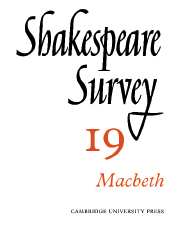Book contents
- Frontmatter
- ‘Macbeth’ in the Twentieth Century
- The Criminal as Tragic Hero: Dramatic Methods
- Antithesis in ‘Macbeth’
- Why was Duncan’s Blood Golden?
- Image and Symbol in ‘Macbeth’
- ‘Macbeth’ and The Furies
- Hell-Castle and its Door-Keeper
- ‘His Fiend-Like Queen’
- The Fiend-Like Queen: A Note on ‘Macbeth’ and Seneca’s ‘Medea
- Shakespeare at Street Level
- New Findings with Regard to the 1624 Protection List
- Shakespeare Productions in the United Kingdom: 1965
- The Royal Shakespeare Company 1965
- The Year's Contributions to Shakespearian Study: 1 Critical Studies
- 2 Shakespeare’s Life, Times and Stage
- 3 Textual Studies
- Index
- Plate Section
The Year's Contributions to Shakespearian Study: 1 - Critical Studies
Published online by Cambridge University Press: 28 March 2007
- Frontmatter
- ‘Macbeth’ in the Twentieth Century
- The Criminal as Tragic Hero: Dramatic Methods
- Antithesis in ‘Macbeth’
- Why was Duncan’s Blood Golden?
- Image and Symbol in ‘Macbeth’
- ‘Macbeth’ and The Furies
- Hell-Castle and its Door-Keeper
- ‘His Fiend-Like Queen’
- The Fiend-Like Queen: A Note on ‘Macbeth’ and Seneca’s ‘Medea
- Shakespeare at Street Level
- New Findings with Regard to the 1624 Protection List
- Shakespeare Productions in the United Kingdom: 1965
- The Royal Shakespeare Company 1965
- The Year's Contributions to Shakespearian Study: 1 Critical Studies
- 2 Shakespeare’s Life, Times and Stage
- 3 Textual Studies
- Index
- Plate Section
Summary
In a useful article reviewing the trends in Shakespeare criticism during this century, Irving Ribner looks ahead to a new generation which may recognize that even in seemingly contradictory approaches there has been room for reconciliation in terms of a common larger tradition. When faced by the critical deluge occasioned by the quatercentenary, it is difficult to share Ribner’s optimism. For, while a large number of articles do certainly complement each other in their illuminations of scenes, speeches, and whole plays, there are also those which assert conclusions among which there is even less chance of reconciliation than there is between Coriolanus and the tribunes. Symptomatic of such fundamental division between critics—and, one suspects, whole groups of critics—are two papers which appear in a single memorial volume and scowl adjacently. In one, Kenneth Myrick claims that a Christian reading of Lear is the only kind that makes sense and, in the light of popular religious handbooks of the period, argues that the dark view of man found in the play is ‘normal in Elizabethan Christianity’. However, it is just this dark view of man that Nicholas Brooke takes to constitute the greatness of the play which he sees as asserting with superb energy a perfectly complete negation in which there are good and bad values which can have no reference beyond themselves and for which there are no ultimate sanctions. Brooke also develops his view at greater length in a monograph on the play in which he follows the five-act structure because ‘the experience of the play, the sense of its significance, develops the sequence of events; and to deprive the events of that sequence and to discuss them as if they were simultaneous, is to falsify the nature of the drama’.
- Type
- Chapter
- Information
- Shakespeare Survey , pp. 119 - 143Publisher: Cambridge University PressPrint publication year: 1967



